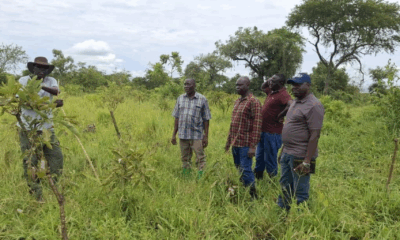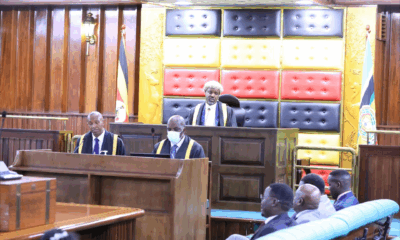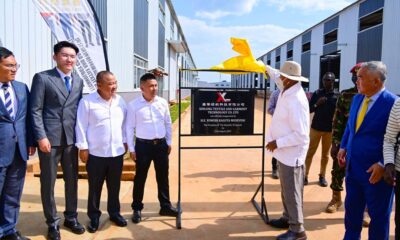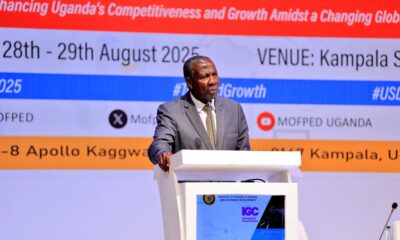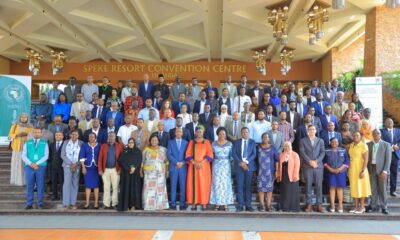Economy
CSBAG Dialogue Hails Uganda’s Shs 875.8 Billion Mineral Investment, Urges Fiscal Discipline
Uganda is set to inject a massive Shs 875.8 billion into mineral-based industrial development, including the crucial oil and gas sector, in the upcoming financial year. This significant allocation, lauded by the Uganda Chamber of Energy and Minerals, signals the government’s steadfast commitment to unlocking the nation’s vast energy and mineral potential and achieving ambitious economic growth targets.
Speaking at the Civil Society Budget Advocacy Group’s (CSBAG) post-budget dialogue at the Sheraton Hotel on June 17, Humphrey Asiimwe, CEO of the Uganda Chamber of Energy and Minerals, described the funding as a “crucial step.” The substantial investment is earmarked for a range of critical initiatives designed to bolster the extractive sector. These include comprehensive efforts to quantify mineral resources like iron ore, gold, and copper, bolster tracking systems for transparency, capitalize the Uganda National Mining Company, and establish vital mineral markets and buying centers. Furthermore, the funds will accelerate the East African Crude Oil Pipeline (EACOP) project and prioritize the long-awaited construction of an oil refinery and refined products pipeline.
While commending the allocation, Asiimwe emphasized the paramount importance of effective and timely implementation. “The private sector is ready and fully committed to partnering with the government to realize the full potential of these initiatives and to ensure Uganda’s mineral and energy sectors deliver broad-based and lasting value,” he asserted, highlighting the need for seamless collaboration between public and private entities.
The dialogue, held under the theme “From Budget to Business: How Fiscal Reforms Can Unlock Trade and Investment Opportunities in Uganda,” served as a platform for various stakeholders to discuss the 2025/26 budget’s strategic and inclusive approach to resource governance. Participants praised the government’s strong commitment to local content, particularly in the oil and gas sector. The policy mandating that 84% of Tier One oil and gas contracts—valued at USD 2.25 billion—be awarded to Ugandan companies was celebrated as a transformative move designed to ensure local businesses directly benefit from resource exploitation. The establishment of the Uganda National Oil Company (UNOC) was also recognized as a strategic effort to manage state interests and further boost local participation.
Investment in large-scale infrastructure projects also garnered significant attention. Initiatives such as the EACOP, Kabalega International Airport, and the construction of over 700 kilometers of roads in the Albertine region were credited with improving logistics, stimulating job creation, and fostering local economic activity. The Chamber further applauded government incentives aimed at capacity building and entrepreneurship, including tax holidays for citizen-owned start-ups and the training of over 14,000 Ugandans in technical oil and gas skills, which are crucial for cultivating innovation and a skilled local workforce.
Private sector players expressed enthusiasm for the government’s push towards mineral beneficiation and refining. The establishment of 10 gold refineries, four cement plants, a tin processing plant, and plans for a 60,000-barrel-per-day oil refinery signal a bold strategic shift towards reducing raw exports and significantly enhancing local value addition.
Representing the Deputy Governor of the Bank of Uganda, Philip Andrew Wabulya, Executive Director for Risk and Strategic Management, outlined the central bank’s crucial role in budget execution. “The Bank of Uganda ensures macroeconomic stability through its Inflation Targeting Lite framework, which maintains price stability and anchors inflation expectations,” Wabulya explained. He added that flexible monetary policy and exchange rate management contribute to creating a stable environment essential for investment and fiscal planning. Wabulya also pointed to targeted interventions like the Agriculture Credit Facility and the Small Business Recovery Fund, which provide affordable credit to farmers and SMEs, thereby contributing to economic resilience and aligning with national budget priorities.
However, Julius Mukunda, Executive Director of CSBAG, injected a note of caution, emphasizing the critical importance of fiscal discipline in the FY2025/26 budget. He called for greater transparency and accountability, urging the government to clear persistent domestic arrears, rationalize borrowing, and ensure timely project completion. “Persistent domestic arrears and rising public debt risk crowding out critical social spending,” Mukunda warned, stressing that fiscal discipline is key. He added that the current 19.1% interest rate is too high for private sector development, and government borrowing is a significant driver of this cost. “We urge the government to seek cheaper, better loans abroad,” Mukunda concluded, underscoring the collective call for a prudent fiscal approach to truly unlock Uganda’s economic potential.
Comments








